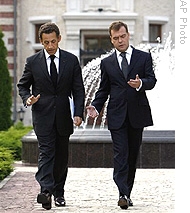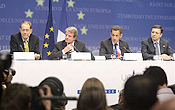VOA标准英语2008年-Europe Weighs Future With Russia(在线收听)
 |
| Presidents Sarkozy (l) and Medvedev at the presidential residence outside Moscow, 08 Sep 2008 |
The crisis in Georgia has been a top priority for the European Union in recent weeks. In August, French President Nicolas Sarkozy - the current EU president - shuttled between Moscow and Tbilisi to cobble a six-point peace deal to end a conflict over the breakaway Georgian region of South Ossetia.
Mr. Sarkozy returned to both capitals earlier this month [Monday 9/8/08] to secure Russia's commitment to abide by the deal.
At about the same time, EU leaders met in Paris [Tuesday 9/9/08] with the president of another key former Soviet republic - Ukraine. The talks ended with an EU offer to establish a special partnership agreement with Kiev. But the 27-member block did not offer Ukraine EU membership.
President Sarkozy said a partnership agreement with Ukraine was as far as Europe was prepared to go at the moment.
Both Georgia and Ukraine aspire to join the EU and the North Atlantic Treaty Organization, or NATO. But Moscow considers both countries within its sphere of influence. And Europe is divided over how close it wants to be with Tbilisi and Kyiv.
During a NATO meeting in April, Georgia and Ukraine were denied a fast track entry into the transatlantic alliance - but promised membership at an unspecified future date. Neither is guaranteed to become part of the European Union.
But Andrew Wilson, an expert on Russia and Eastern Europe at the European Council on Foreign Affairs, says the EU is moving closer to bringing both countries into its fold.
"Some EU member states, NATO member states, concluded we made a mistake back in April and should have offered a membership action plan to both countries and that we sent the wrong signal to Russia by not doing so. Some conclude the exact opposite. But overall, I think the balance of power, the balance of opinion has shifted within the EU, within NATO, toward more positive treatment for both [Georgia and Ukraine]," said Wilson.
 |
| EU leaders at news conference in Brussels, 1 Sep 2008 |
Experts say the EU is also treading carefully on issues involving Russia, which supplies a quarter of Western Europe's natural gas. At an EU summit on the Georgian crisis earlier this month, European leaders refrained from considering tough measures such as sanctions against Moscow for not fully withdrawing from Georgian territory.
For the moment, says Amanda Akcakoca, a policy analyst at the European Policy Center in Brussels, Europe has limited leverage over Moscow.
"It's probably true that at least in the short-to-medium term, the EU probably doesn't have that much influence over Russia," said Akcakoca. "Russia really holds most of the cards, which is why the EU has really come up with a mild response toward Russia. Even if you managed to get unity within the response, there are still an awful lot of divisions - principally because of a number of member states being reliant on Russian energy."
The divisions between Russia and the West have raised concerns about a new Cold War developing. But analyst Amanda Akcakoca downplays such a scenario.
"I think the only similarity is that during the Cold War, Europe really played an excellent role in keeping the channels of communications open [with Russia] and this is what Europe is doing now, whereas other countries, particularly the United States, haven't really gone down that road," said Akcakoca.
Still, most analysts say Europe needs to decide how much to commit itself to Georgia and Ukraine. As it debates whether to expend its membership to include Turkey, the EU must also decide how far to move into Eastern Europe.
Some experts warn that the EU's eastward expansion risks conflict with Russia. But Andrew Wilson of the European Council on Foreign Affairs argues for a combination of what he calls "strategic disengagement" with Russia and engagement with former Soviet Satellites.
"To keep Russia at arms length and to impose, for example, stricter finance regulations on Russia in western markets. But also, most importantly, to engage much more positively in the European neighborhood," said Wilson.
Europe's means might be limited right now, Wilson says, but in the long term, it is much more powerful than it thinks - especially as it begins to diversify its energy sources.